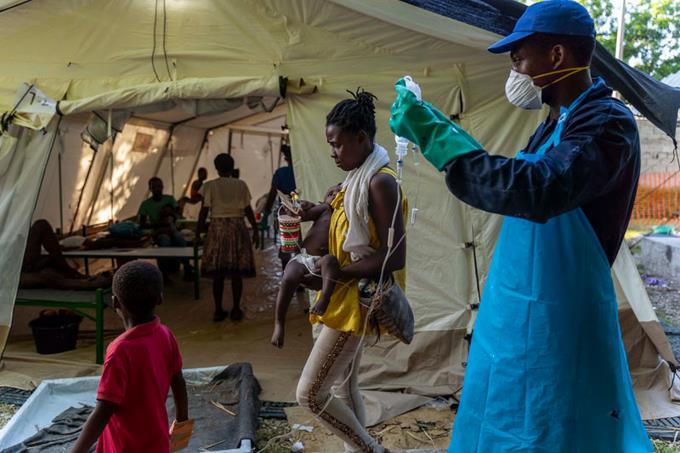Cholera, a disease that can be fatal in a few hours and has reappeared in Haiti, is a catastrophe that is once again shaking poor countries, mainly due to climate change.
This contagious condition, which caused more than 10,000 deaths in Haiti between 2010 and 2019 after being introduced by the UN blue helmets, has been detected again on the island, with at least 33 deaths registered until October 19, according to the country’s health authorities.
acute intestinal infection
Cholera is an acute diarrheal infection caused by the ingestion of food or water contaminated by a bacterium, the bacillus vibrio cholerae.
Three quarters of infected people do not have any symptoms.
But when it manifests, it can be very virulent in 10% to 20% of cases, with severe diarrhea and vomiting that cause accelerated dehydration.
Without treatment, cholera is one of the most rapidly fatal contagious diseases: death can occur in one to three days.
In that case, death can only be prevented by infusion treatment, with the administration of rehydration salts and antibiotics.
indian origin
Before the 19th century, cholera had only been detected in the Ganges delta region of India.
Beginning in 1817, the disease spread to Asia, the Middle East, and East Africa.
Then, in several pandemic waves, all originating from the Asian continent, it reaches Central Asia, Europe, the Americas, and all of Africa.
Poverty and conflicts
The countries where cholera has reappeared are all marked by poverty, instability and armed conflict. This is the case of Haiti, Syria, Democratic Republic of the Congo, Yemen…
"There is a close relationship between cholera transmission and insufficient access to clean water and sanitation facilities"says the World Health Organization (WHO).
Typical places of risk are slums and refugee camps, according to the WHO, which warns that humanitarian crises, with displacement of populations to inadequate and overcrowded camps, considerably increase the risk of epidemic outbreaks.
Climate change
Climate change increases the intensity and frequency of floods, cyclones and droughts. This makes it difficult to access drinking water and "creates an ideal environment for the development of cholera"warns the WHO.
The organization has observed "worrying upsurge" of cholera epidemics in 2022, after years of reduction.
The WHO does not publish figures on deaths, due to the lack of reliable statistics in the affected countries. But a 2015 US study estimated the number of deaths from cholera at between 21,000 and 143,000 each year.
Insufficient vaccinations
There are several oral vaccines and the WHO advises their use "in cholera endemic areas, in humanitarian crises with high risk of cholera and during cholera outbreaks".
The multiplication of outbreaks in the world has limited the reserves of the vaccines, until reaching a situation of scarcity, warns the WHO.
The organization announced on October 19 that it would administer a single dose of cholera vaccine instead of the recommended two, in order to treat more people.
